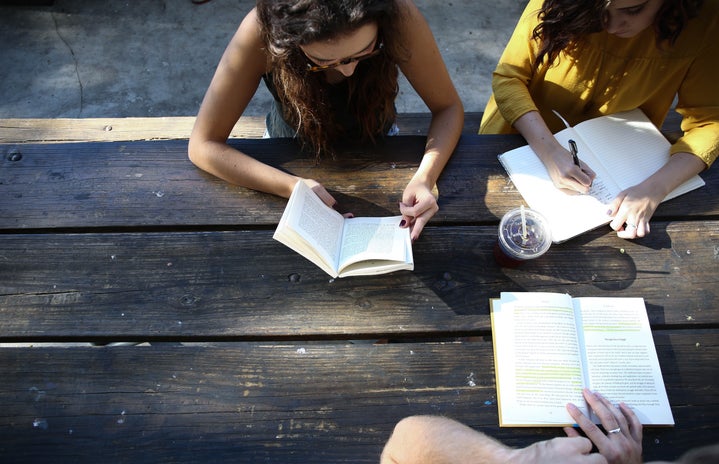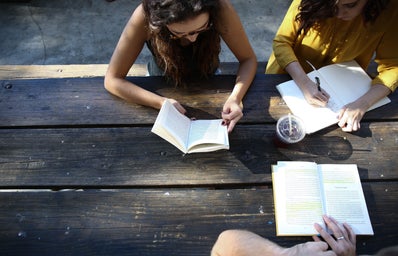Deep in the Catoctin Mountains, just on the border between Pennsylvania and Maryland, resides an overnight summer camp. Calling for Jewish girls aged 7 through 17 from around the world, Camp Louise acts as a safe haven for the summer. Hundreds of young women flood the gates of the small camp in mid-June and July, their mesmerized eyes filled with hope, anxiety and excitement about the weeks to come. As they stride up the hill on opening day, shins burning, girls are welcomed by the sight of reuniting friends, the sounds of harmonized songs and the smells of nature.
Beginning my camp journey at the age of 13, I was late to enter the tight-knit female community. I feared facing judgment from the other girls my age or invading an already-established friend group. I stayed close to my parents, grasping their arms with an immovable grip, knowing my only form of contact with them for the next month would be the letters that we exchanged back and forth. “What if I’m miserable here?” I thought. Walking toward my assigned bunk, toiletries in hand, I began to tear up.
On the porch of my bunk, I was met by the friendly new faces of my counselors. Almost immediately, I was introduced to the 11 other girls my age. Most were taller, seemingly louder and more confident than I was, and I felt intimidated. I was shown to my living area for the upcoming four weeks and offered help with unpacking my belongings. As I made my bed, I noticed that directly next to me, perched atop a bunk bed, sat a girl crying, wearing all black. I could sense she was also new and introduced myself.
From then on, the girl, Sunny, and I stuck together. As the new kids in the bunk, we initially sat on the ends of lunch tables and remained on the outskirts of circles. All the other girls had been attending camp since they were much younger and had thus already known each other. I could tell that they were all kind and genuine, but I still worried that their judgments of me would be harsh.
As the weeks went on, however, the other girls in our bunk became more comfortable with us. We were included in bunk activities, invited to sit on the porch with everyone and asked questions about ourselves. I cannot recall the exact timing, but our bunk of 12 bonded seemingly overnight. From then on, card games, deep talks and inside jokes between all the girls became the norm. Girls from other bunks in our age group longingly observed our bunk’s growing closeness. I felt freer to be myself than I had in a long time. I was loud and energetic and had so much fun.
One of the most liberating parts of camp is the absolute privacy from men. At an all-girls’ camp, concealed from the pressures of the male gaze, girls can be themselves; they can look how they want and act how they want. Day-to-day, no girls wear makeup or worry about outfit choices. The everyday camp attire consisted of baggy t-shirts, athletic shorts and crocs in sport mode. As you walk around camp, girls call out to compliment each other’s hairstyles, bracelets, funny t-shirts and Jibbitz. Camp proved it to me; without the instigations of men, there is virtually no competition between women. It was only in the coming days before visiting our brother camp that other girls our age started caring about how they appeared. They would stress to find time to shave their legs and straighten their hair in preparation for the boys on the other side of the mountain. My bunk, however, was indifferent towards them. While perhaps in the outside world we’d care more about receiving male validation, at camp my friends and I had become comfortable with our natural selves. We attended the co-ed events that summer wearing our daily camp wear.
Every Friday at Camp, all age groups of girls come together to welcome in Shabbat. We congregate in an outdoor round auditorium, wearing all white to signify purity and new beginnings. As everyone joins in song, friendships blossom before your eyes. Girls sway with their arms around one another, smiling as they sing along to the blessings. The whole camp walks to the dining hall together for a traditional Shabbat dinner. The cafeteria fills with the sound of girls chatting and laughing, which dies down when the food comes out. After the meal, we all dance hand-in-hand. There is no judgment, only carefree fun. We continue until the night is over.
By the end of my first summer, I had fallen in love with the beautiful place I had lived and the beautiful people I had met. On the last day, one month after my parents had dropped me off in this new place, they returned to bring me back home. I cried, not wanting to leave. I begged for them to allow me to come back the next year.
Six years later, I still spend my summers at Camp Louise, only now as a counselor. I have the privilege of witnessing my campers experience the same magic that I became so enchanted by throughout five years. Camp is, to this day, the happiest, most serene place in the world to me. There, I came into my own. For a few months each summer, I leave my technology and negative thoughts behind and give in to the uplifting nature of a sleepaway camp. I have made life-long friends and memories at camp that have influenced my views on what womanhood means. To me, it means staying true to yourself, no matter who’s watching. It means strength and empowerment. It means not taking things too seriously. It means having confidence. It means building up and loving those around you. I am forever appreciative of my time spent at Camp Louise and who it has made me.
Want to see more HCFSU? Be sure to like us on Facebook and follow us on Instagram, Twitter, TikTok, YouTube and Pinterest!


